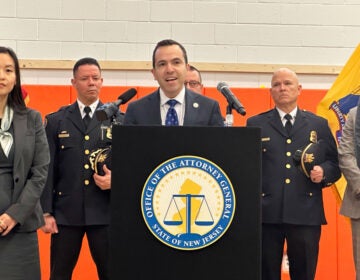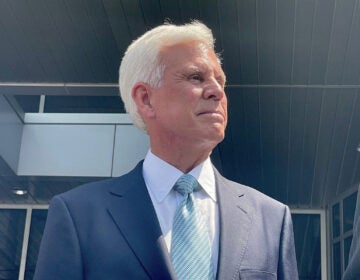NJ Senate may vote on Christie’s controversial Pinelands Commission nominee this week

The sun shines through snow-covered pine trees in the New Jersey Pinelands in Manchester, N.J. on Dec. 11, 2013. (AP Photo/Wayne Parry)
Editor’s note: The New Jersey Senate approved Robert Barr’s nomination to the Pinelands Commission on Monday, March 16, 2015 by a vote of 22-16)
The bitter dispute over a proposed natural-gas pipeline through the Pinelands could be decided by the state Senate today, if lawmakers approve Gov. Chris Christie’s nomination to change the balance of power on the deadlocked Pinelands Commission.
The move aims to replace Pinelands Commissioner Robert Jackson, who has voted against the proposed South Jersey Gas pipeline, with Robert Barr, a political supporter of pipeline proponent Sen. Jeffrey Van Drew (D-Cape) May.
A favorable ruling on the 22-mile pipeline route will enable South Jersey Gas to rebuild and re-power the obsolete, coal-fired B.L. England power station in upper Cape May County.
But extensive email correspondence shows an unusual degree of engagement by the governor’s office with the Pinelands Commission in the months leading up to a failed January 2014 attempt to win approval for the pipeline. Opponents of the project, who went to court to force the release of those emails, say the documents bolster their conviction that the Christie administration is intent on stacking the commission for another vote.
What’s more, environmental groups warn that the commission’s independence from political pressure — and that of New Jersey’s other independent executive agencies — is at stake. In an unusual move, this month four former governors — Brendan T. Byrne, Thomas H. Kean, James J. Florio, and Christine Todd Whitman — warned senators against “a nomination (that) would undermine the independence of the Pinelands Commission.”
The Christie administration denies it is trying to stack the commission for a second attempt at a pro-pipeline vote. Christie spokesman Kevin Roberts has called the charge “just more baseless nonsense from overwrought partisans who oppose any action by this administration, no matter how factually sound the policy is.”
But pipeline critics say they have evidence: voluminous emails showing that there was a close, at times nearly day-to-day working relationship, between commission executive director Nancy Wittenberg and other staffers at the state Pinelands Commission, South Jersey Gas, and the governor’s office.
In back-and-forth emails, Pinelands staffers and a lawyer for South Jersey Gas exchanged a draft plan, called a memorandum of agreement (MOA) for the pipeline in months and days before it failed in a tie vote among commissioners a year ago.
The extensive email series, posted on the Pinelands Preservation Alliance website, began with a message from Peter J. Fontaine, the gas company’s lawyer, to Stacey Roth, an attorney for the Pinelands Commission. It is dated March 3, 2013, long before commissioners were told what was going on:
“Dear Stacey: Per our discussion, I enclose a draft MOA between the Commission and the Board. Please feel free to call if you have any questions about it. The Petition for the pipeline route should be filed within the next few days. I will forward the petition to you upon filing. Best regards, Pete.”
Flurries of emails in November 2013, and again days before the final MOA was presented to commissioners, show South Jersey Gas officials and Pinelands staff conferring over wording and details of the agreement. Meanwhile, more November emails refer to an upcoming public hearing, and critics’ protests that it was rushed.
Other emails, although heavily redacted, show Christie’s office kept close track of the proposal — and quickly learned of a potential conflict of interest that was used in December 2013 to keep Pinelands commissioner and pipeline skeptic Edward Lloydfrom deliberating with his colleagues.
Lloyd, an environmental law professor at Columbia University, is also a co-founder of the Eastern Environmental Law Center, a nonprofit group whose staff lawyer had sent a December 5, 2013, letter calling for delaying a public hearing on the pipeline plan.
All text is blacked out in several December 6, 2013, emails, but they show how commission lawyer Roth that morning forwarded the letter to the governor’s office and Fontaine, the gas company lawyer. That evening, Lloyd got a call from two deputy attorney generals advising him to recuse himself from pipeline discussions because an ethics complaint had been filed.
“Even the redacted emails show how intimately the governor’s office was involved on a day-to-day basis,” said Carleton Montgomery, executive director of the Pinelands Preservation Alliance, which first sought the emails with a request under Open Public Records Act, and finally went to court to force release of the messages.
“That’s not the way an independent agency is supposed to operate,” Montgomery said.
Technically, it was the state Board of Public Utilities seeking an exemption from a long-standing Pinelands prohibition on a new transmission pipeline through forest areas, contending it is needed for power reliability — especially in light of the planned shutdown of the Oyster Creek nuclear reactor in Ocean County in 2019.
That fact means the level of consultation with South Jersey Gas “is extremely unusual,” Montgomery said. “Strictly speaking, they’re not an applicant, they’re a third party like us.”
But the emails show “after hours, they’re allowed to review and edit the document,” he added.
“What the emails show is the governor’s office was involved, almost in real time” as Lloyd was to be confronted with the conflict allegation, said activist Bill Wolfe, a former state environmental analyst now with the Public Employees for Environmental Responsibility.
In a terse prepared statement, commission director Wittenberg has said there was no evidence of wrongdoing in the email records, despite the criticism of Wolfe and others.
“Their comments are pure hyperbole and show a lack of understanding of the commission’s rules and procedures. The commission prides itself on being transparent and provides for and encourages public comment at all of our meetings. It is unfortunate that a few individuals take these opportunities to mislead, disrupt and promote their own agendas.”
At a January 30 meeting in their Pemberton Township offices, Pinelands commissioners debated the propriety of those emails. In a closed session, they told their lawyers and executive director Wittenberg to provide them with complete, unredacted emails to read.
Commissioners can’t tell the staff “not to talk to the public,” said commissioner Alan Avery, who compared the messages to pre-application conferences that anyone from a homeowner to a business can request.
“That’s not the point here. The point is any of those conversations have to be part of the public record,” Lloyd replied.
That proposal stalled January 10 of last year, when the commission — by then 14 members sitting, after Lloyd’s forced recusal — deadlocked in a 7-7 vote.
Now Pinelands Commission chairman Mark Lohbauer has called for an overhaul of the commission’s MOA rules. In his view, the problem with the pipeline goes all the way back to 2004, when the commission granted an agreement to build power lines in the forest area.
The southern Ocean County power lines built by Conectiv (now Atlantic City Electric) went up the west side of the Garden State Parkway — sparing Conectiv the headache of fighting opposition from residential neighborhoods on the east side of the thoroughfare.
In exchange, the commission got millions from Conectiv to buy and preserve wild lands around the Mullica and Wading rivers. But critics say it set a bad precedent that has led to the pipeline conflict.
South Jersey Gas and Houston-based Rockland Capital, have been lining up support from South Jersey political, labor, and business leaders to make another run at winning Pinelands approval.
The plan has united political and labor leaders in a region hit hard by recession, and reeling anew from Atlantic City casino closings and layoffs.
“It amounts to hundreds of jobs, and that’s extremely important in an area that has the highest unemployment rate in the state of New Jersey, and some of the highest unemployment rates in the United States — Cape May, Atlantic, and Cumberland counties,” senator Van Drew said.
Pipeline construction would provide more than 100 jobs, followed by hundreds of construction jobs to convert the power station in Upper Township, Van Drew said.
Emergence of the emails this winter may have deepened divisions on the Pinelands Commission, and Barr could be the new swing vote. Lohbauer is adamant about the need to reexamine procedures for making these big agreements with utility companies, while other commissioners disagree.
The email exchanges show discussion of details between staffers and the company even as Pinelands commissioners themselves were asking for more of that information and not getting it, said David Pringle, campaign director for the New Jersey Environmental Federation that opposes the pipeline plan.
“It was all a ruse. It wasn’t even disclosed to the people the staff work for,” Pringle said. “The staff works for the commissioners. They don’t work for the governor.”
_________________________________________________
NJ Spotlight, an independent online news service on issues critical to New Jersey, makes its in-depth reporting available to NewsWorks.
WHYY is your source for fact-based, in-depth journalism and information. As a nonprofit organization, we rely on financial support from readers like you. Please give today.




